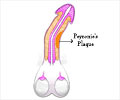A new study has come up with a new potential target for treating atherosclerosis.

"Until now, the thinking was that inflammatory macrophages arise mainly from the recruitment of their precursors — monocytes — from the bloodstream," said Clint Robbins, lead author on the study and an Assistant Professor in U of T's Departments of Laboratory Medicine and Pathobiology, and Immunology. "Our study shows that the accumulation of macrophages also depends on their proliferation locally within the developing plaque."
The journal Nature Medicine published the study results today.
The impact of the research on clinical treatments could be large. Many pharmaceutical companies are pouring resources into potential therapies that can block the recruitment of white blood cells into plaques. But if macrophages self-sustain through local cell division, blocking recruitment may not be the best strategy.
"I think this work will force some major re-evaluations," said Filip Swirski, the study's principal investigator who is a scientist in the Center for Systems Biology at Massachusetts General Hospital and an Assistant Professor at Harvard Medical School. "People have been thinking of targeting monocyte influx to treat atherosclerosis, but they need to consider macrophage proliferation as an additional or alternative approach, especially in established disease."
That approach might be better than targeting circulating monocytes, since interrupting disease-causing processes within plaques could spare other beneficial immune responses that monocytes control, said Swirski.
Advertisement
"Additional targeting of macrophage proliferation may further decrease inflammation in atherosclerosis and prove clinically advantageous," said Robbins, who is also a scientist in the Toronto General Research Institute at University Health Network.
Advertisement
Next, the team will compare macrophage proliferation to monocyte recruitment during different stages of atherosclerosis, and look at whether all macrophages, or only subsets, replicate.
Source-Eurekalert















